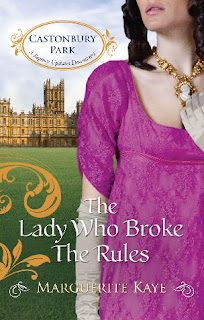The Riskies welcome back Marguerite Kaye, who is here to talk about her new release, the third in the “Castonbury Park” series from Harlequin Historicals….
Slave to Love! And a Giveaway
The Lady Who Broke the Rules is my book from the Regency upstairs/downstairs series Castonbury Park. My heroine is Lady Kate, the eldest daughter of the wealthy Montague family, a philanthropist and abolitionist. My hero is Virgil Jackson, a freed slave.
The Riskies welcome back Marguerite Kaye, who is here to talk about her new release, the third in the “Castonbury Park” series from Harlequin Historicals….
‘We want scandal, scandal, scandal,’ our editor told us eight authors when we first embarked on the ‘Castonbury Park’ journey, and a freed black slave seemed to me like a brilliant starting point. Any man who could survive the horrors of slavery and succeed on his own terms as Virgil does would have to be unbelievably strong-willed, yet at the same time, coming from such a traumatic background, he had to have some deep-seated issues of his own to contend with. Virgil is a free man, but he’s still a slave to his past
The history of slavery is a complex, emotive and controversial subject, one that has always fascinated me, but I have to admit there where times when I thought I’d taken a step too far in making a freed slave a romantic hero. However, with the Castonbury Park series is set at a time when slavery was being challenged in both the Old and the New Worlds, I’m always keen to push boundaries in my stories, so I stuck with it, and I’m glad I did.
The Lady Who Broke the Rules is set in 1816. In the United States, the trade of slaves was abolished in the north in 1804, after which manumission in those states gathered momentum. In the south though, cotton was in increasing demand (paradoxically thanks to the north’s industrialisation of textile manufacture), slaves were a hugely important part of the economy, and resistance to abolition was significant.
Virgil was born into slavery in the south and freed in the north. He was one of the fortunate ones who came to true eminence and used his wealth to give others the chances he had had to make for himself. Though in reality this kind of success was rare, it was not unheard of. Robert Purvis is just one example of the black philanthropists from whom I took inspiration for Virgil, but his entrepreneurial side is an amalgamation of a whole number of black men and women who flourished in Nineteenth Century Boston, renting out real estate, setting up restaurants and beauty parlours, making shoes and clothes for the mass market, taking on the Establishment by training as lawyers and doctors.
Across the pond, a huge number of aristocratic families had derived a large part of their wealth from plantations in the West Indies which relied on slavery, but their influence was on the decline. The actual trade of slaves became illegal in 1807, and although it was not until 1833 that slavery itself was abolished, by 1816 the growing Abolitionist movement, coupled with the decline of the economic significance of the West Indies plantations, made the idea, if not the reality, of slavery much less politically and socially acceptable than it had been a decade or so before.
My research for The Lady Who Broke the Rules taught me that a large number of the British abolitionists were women, and so I made my heroine, Lady Kate Montague, one of them. It was one of the few political causes in which it became acceptable for women to participate, and in which women took a leading and influential role. I relished the opportunity to create a heroine who could, without it seeming a historical anachronism, be active politically and philanthropically. Josiah Wedgewood’s daughter Sarah, who introduces Kate to Virgil, was just one real life example I drew on when writing her.
There’s a huge difference between perception and reality. Kate, like me, had only read about slavery. Virgil had experienced it. As a writer, I had to try and imagine myself in both sets of shoes. Whether I’ve managed it or not – well, that’s for you to decide.
I have a signed copy of Kate and Virgil’s story to give away. Just leave a comment for a chance to win.
The Lady Who Broke the Rules (Castonbury Park 3) is out in October in the UK, digital only in the US and Canada, though it will be released in a print duo (Ladies of Disrepute) with Book 4 in December. Here is the blurb:
‘Your rebellion has not gone unnoticed…’ Anticipating her wedding vows and then breaking off the engagement has left Kate Montague’s social status in tatters. She hides her hurt at her family’s disapproval behind a resolutely optimistic facade, but one thing really grates…For a fallen woman, she knows shockingly little about passion! Could Virgil Jackson be the man to teach her? A freed slave turned successful businessman, his striking good looks and lethally restrained power throw normally composed Kate into a tailspin! She’s already scandalised society, but succumbing to her craving for Virgil would be the most outrageous thing Kate’s done by far…
There’s excerpts, background and more about my books on www.margueritekaye.com.




